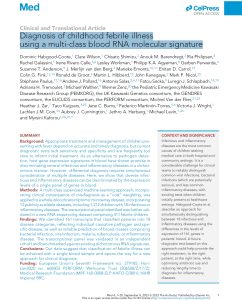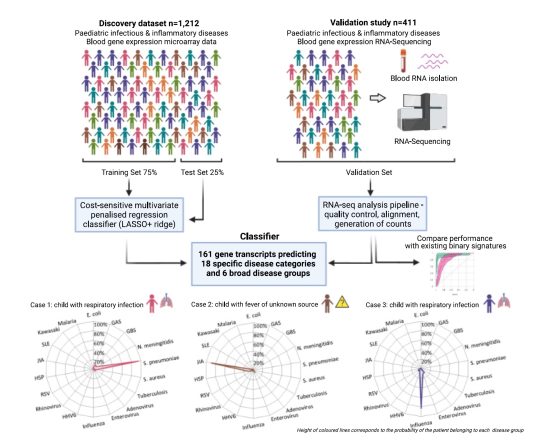It is with great excitement that we announce the publication of preliminary findings on more than a decade of research to detect and diagnose the cause of a febrile illness based on patterns of gene expression with a quick blood test.
Using a single sample of blood, a new test can be developed that may enable clinicians to diagnose the cause of fever based on the distinctive pattern of genes being ‘switched on or off’ by the body in response to specific illnesses.
This great achievement was the result of several international collaborations including the EUCLIDS, PERFORM and GENDRES consortia led by researchers at Imperial College London.
This foundational work was what led to the later establishment of the DIAMONDS consortium in 2020.
With the use of a multi-class supervised machine-learning approach a 161-gene signature was discovered that can simultaneously detect and distinguish between 18 disease categories including bacterial infection, viral infection, malaria and tuberculosis or inflammatory disease as well as the individual causative pathogen detection in case of infection.
This was a proof-of concept study showing that with the use of this novel approach it may be possible to make the diagnosis of a life-threatening infection or a serious inflammatory disease such as Kawasaki disease with a single blood test.
While current tests for some of these conditions can take several hours, days or even weeks, a test-based on this approach would be capable of providing a result in under 60 minutes.
As commented by the authors, “the multi-class diagnostic test for febrile illness may reduce delays to diagnoses, missed diagnoses, and unnecessary antibiotic treatment with a significant impact on global health”. “A future diagnostic test based on this approach could help provide the right treatment, to the right patient, at the right time, while optimizing antibiotic use and reducing lengthy time to diagnosis for inflammatory diseases”.
The next step is to test this novel approach in a pilot study as part of the international, multi-partner DIAMONDS project with the enrollment of a large number of patients from Europe, Asia and Africa. This phase will assess this new approach against the current gold standard for clinical diagnosis, and how likely it is to change clinical decision making.
The paper entitled “Diagnosis of childhood febrile illness using a multi-class blood RNA molecular signature” by Habgood-Coote D. et al was published last week in the journal Cell Press Med, and it is built on more than a decade of research to detect and diagnose illnesses based on patterns of gene expression.
The article has received large media attention including the BBC, The Guardian, Daily Mail, Telegraph, ITV and others.






